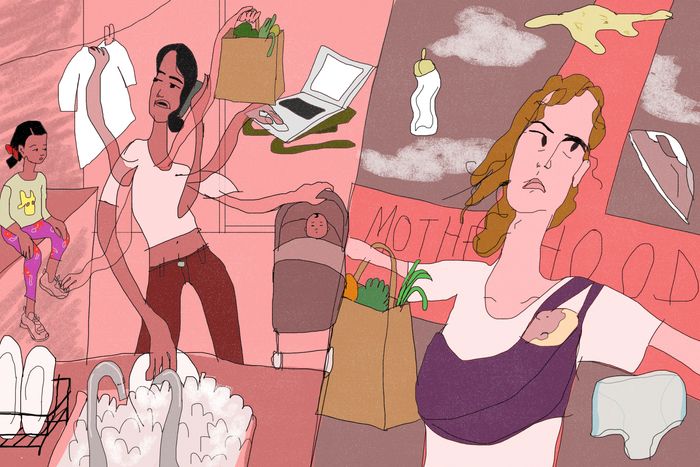
This article originally appeared in Brooding, a newsletter delivering deep thoughts on modern family life. Sign up here.
I used to think “manifesting your future” was corny, but now I’m into it. How else do you decide what you really care about? When I was young, I assumed your priorities appeared before you magically — you’d “just know.” Now I know that sometimes you have to decide to care about something, just as you have to decide to have fun. And this year, same as last year, I care about affordable child care.
I want to hear about affordable child care from every possible outlet, and never will I tire of it. I want to hear Kai Ryssdal, who has four grown kids, use his serious voice when introducing a segment on how much it will cost the government. This year, I want to be mansplained about the importance of affordable child care. For the sake of the cause, I will nod and be nice and make a man without children feel smart and important for having told me about it — and I’ll like it. I want artists and celebrities to make inane and tone-deaf viral videos about it. I want Cardi B to demand it on behalf of her fans and Gwyneth to murmur about it on Instagram. I want direct-to-consumer fashion brands to compete for my attention by trying to out-care each other with infographic posts about its necessity.
As silly as some of this might seem, these are some of the atmospheric signs that political change is imminent in America. Politics starts out as storytelling, and the storytelling around the child-care emergency is changing. For affordable child care to be an interesting story for people living in individualistic cultures, it has to be about something other than children. Today, child care is becoming a story about wellness. Wellness, unlike a general fight for collective rights, is something easy to think about in terms of individual needs. Wellness, unlike a mass of angry protesters with demands that are confusing and sometimes contradictory, is appealing. It’s shoppable.
In the corners of the internet where working moms gather, there is a growing and powerful narrative about the need for affordable child care and parental leave, and it’s being led by women of means. Maternal wellness in all its forms, from postpartum emotional support to nutrition to access to medical care, has become a major cause among wealthy women, both politically and philanthropically, and affordable child care is often talked about as part of that larger issue.
I’m seeing mothers like Blessing Adesiyan’s Mother Honestly platform, the women-owned brands behind Chamber of Mothers, and accounts like Alexis Barad-Cutler’s Not Safe for Mom Group speaking out about the need for accessible affordable child care, and their demands are urgent and uncompromising. They are also often made in the context of maternal wellness. This narrative, which is rooted in the needs of the self, is what is catching on. If there’s any narrative that might be able to get the job done, it’s this one.
Getting powerful people to care about affordable child care has been difficult because it hasn’t been an issue that troubles the rich historically. It’s also an issue that people age out of after four or five years as kids get old enough for school. I sometimes wonder if part of why there’s basically no cheap day care is that parents are too busy to fight for it while they need it most, and as soon as their kids age out of the problem, they carry on with their lives, relieved they made it.
For the past 50 years, the only way to get politicians to care about child care was to make it a national-security problem or a demographics problem. The stories told about child care needed to be framed in such a way that men with no skin in the game whatsoever (thanks to the work of stay-at-home wives and nannies) could comprehend the need for having children cared for outside the home.
The U.S. Defense Department operates the country’s largest subsidized day-care program, spending $1 billion a year on caring for about 200,000 children in military families. That’s thanks in large part to the decades-long project by M.A. Lucas, who created the U.S. Military’s Child Development Program in the 1980s. In order to sell the idea to the DoD, Lucas emphasized that the lack of child care was hindering service members’ readiness. “We talked about the impact of the lack of child care on the military force,” she told NPR in an interview. “We didn’t talk about children.”
Quebec runs North America’s largest subsidized day-care program, which was founded in the mid-’90s as a nationalist project run by the separatist Parti Québécois to boost the economy of a would-be independent nation. The province underwent a dramatic decade of secularization during the ’70s — before then, it had been run almost entirely by the Catholic Church — and this led to a plummeting birth rate. In the early ’90s, Quebec’s movement for sovereignty was on the rise, and if it was to be a nation, it needed new citizens being born. Thirty years later, despite being far from perfect, it still works.
There are plenty of ways to make a case for affordable, accessible child care today without talking about children — but a narrative has to ignite the imagination of everyday people. You could make it a productivity issue: American productivity is on a remarkable downward trend, and having more accessible child care would make a huge difference for working mothers in particular. But this narrative is far more compelling to corporate interests than it is to working people.
I’ll admit that it makes me a little bit nervous that affordable care has been subsumed into a wellness narrative. It’s not that I think holistic maternal wellness isn’t important. But wellness talk carries us into the imaginary of the individual, which is a seductive place, especially for people who can afford to surround themselves in beauty. Wellness means community and mutual support, but depending on whom you’re talking to, it also means expensive juices and organic fibers and very specific ways of living — ways that are neither accessible nor interesting for most people. The reality of affordable child care isn’t beautiful or even cute.
Wellness practices can be very rewarding, and sharing them can provide a sense of moral purpose — you can help improve people’s lives for real. Wellness teaches us that empowerment and self-confidence are the keys to human flourishing, and those lessons are really hard to let go of. But the project of affordable child care is ultimately not about the self at all; it’s about the collective. At some point, a narrative about taking care of ourselves has to evolve into a narrative about taking care of one another. I can’t wait to see it.
More From This Newsletter
- Is Annoyance the Most Romantic Emotion?
- Trad or Not, We’re All Nostalgic for a Fake Past
- Should Kids Really Learn About Getting Rich?


